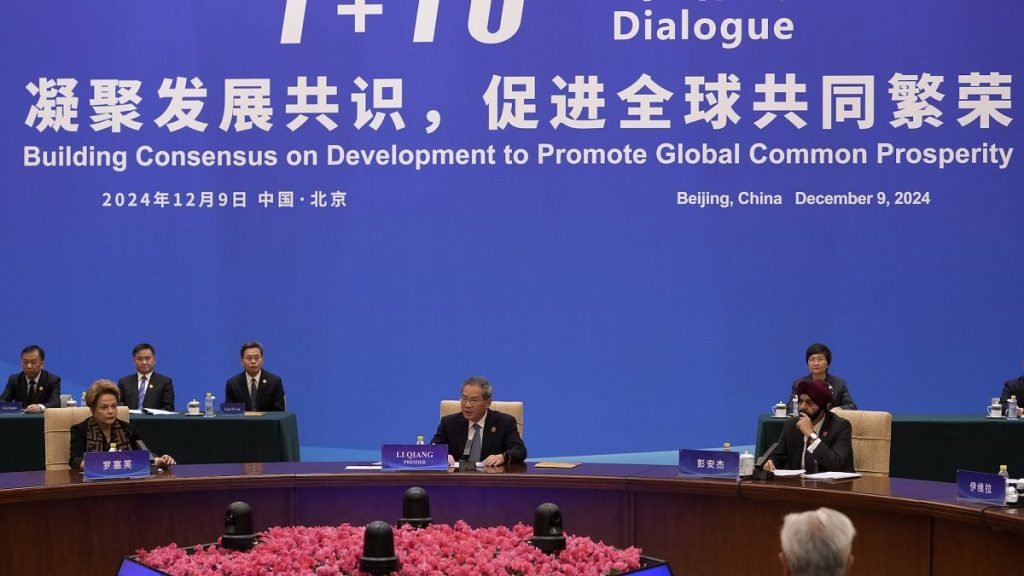China Signals Pro-Growth Policy Shift Amid Economic Headwinds
China’s top leadership has announced a significant policy shift towards stimulating its slowing economy, signaling a move away from the "prudent" monetary policies maintained for the past 14 years. This shift comes as the country grapples with sluggish growth, a subdued property market, and weakened consumer spending in the aftermath of the COVID-19 pandemic. Following a meeting of the ruling Communist Party’s Politburo, state media reported that the government would implement "more active fiscal policies and moderately loose monetary policies," marking a notable departure from previous stances and suggesting a proactive approach to bolstering economic activity. This announcement was met with positive market reaction, with Hong Kong’s Hang Seng index surging nearly 3% on the news. Analysts interpret this policy shift as a direct response to the prevailing economic challenges, including the potential impact of escalating trade tensions and tariffs on Chinese exports.
The Politburo’s statement reiterates earlier policy pronouncements aimed at encouraging increased spending by businesses and households. Over the past several months, the central bank and regulatory bodies have introduced various measures to stimulate economic activity, and the recent announcement reaffirms this commitment. Experts see the shift as a significant recalibration of China’s economic strategy, reminiscent of the measures taken during the 2008 global financial crisis. This policy direction is expected to pave the way for potential interest rate cuts in the coming year, further easing financial conditions and encouraging investment and spending. The upcoming annual economic planning meeting will solidify these policy directions for the year ahead, setting the stage for a renewed focus on growth.
China’s economy has been facing headwinds, with growth falling short of the official 5% target for the year. The property market, a crucial driver of economic activity, remains subdued, while consumer spending has not fully recovered from the impact of the pandemic. The Politburo’s statement emphasizes a "combination punch" approach, utilizing both government spending and easier credit conditions to boost consumption and revitalize the economy. This strategy aims to address the underlying weakness in demand and inject much-needed momentum into the economy.
The announcement of the policy shift coincided with the release of November’s consumer inflation data, which came in lower than expected at 0.2%, down from 0.3% the previous month. This lower inflation rate provides further room for the central bank to cut interest rates, offering another lever to stimulate economic activity. The persistent challenges of high youth unemployment, declining housing prices, and job instability have impacted household finances and consumer confidence. The Politburo’s statement acknowledges these concerns and emphasizes the importance of improving the "people’s sense of gain, happiness, and security," underscoring the government’s focus on addressing the social and economic well-being of its citizens.
Premier Li Qiang, who oversees the economy, addressed the heads of major international financial institutions, including the World Bank, on the same day as the Politburo’s announcement. While not directly naming the United States, Li criticized countries that impose trade restrictions, including higher tariffs and protectionist measures, indirectly referencing the escalating trade tensions between China and the US. He argued that such actions further hinder global economic growth, particularly at a time of already weakened economic conditions worldwide. Li’s remarks highlight the broader geopolitical context of China’s economic challenges and underscore the government’s concerns about the impact of trade disputes on its growth prospects.
The policy shift announced by China’s leadership represents a significant response to the economic challenges facing the country. The move towards more active fiscal and moderately loose monetary policies signifies a proactive approach to stimulating growth and addressing the issues of weak consumer spending, a sluggish property market, and high youth unemployment. While the full impact of these policies remains to be seen, the initial market reaction suggests a positive reception to the government’s commitment to supporting the economy. The upcoming economic planning meeting will provide further details on the specific measures to be implemented and offer a clearer picture of China’s economic strategy for the coming year. The focus on boosting domestic demand and navigating global trade tensions will be key priorities as China strives to achieve its growth objectives and ensure the well-being of its citizens.














